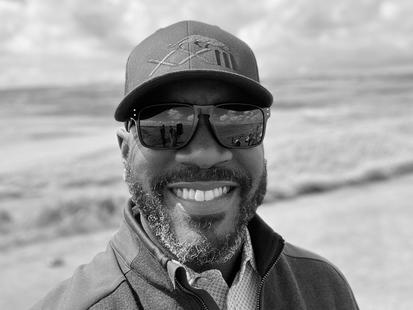
Carl Peoples
MBA '94, Managing Director, Goldman Sachs
City
Industry
Areas of Expertise
As a first-generation college student, Carl Peoples (MBA ’94) didn’t have a blueprint for building a career through higher ed. Rather, Peoples says he was “feeling my way along.” Toting an economics degree from William & Mary and a handful of years in retail banking, he found his way to Darden in search of something new. Now he’s sporting an 18- year career in investment management in Atlanta, Georgia, at Goldman Sachs, “the best firm to do private wealth management in the world.”
His hunger for challenge made Darden his business school of choice, with its reputation as a rigorous program that facilitated “testing yourself against some of the brightest people you’ll ever meet.” After Darden, corporate and investment banking took Peoples to Atlanta. He resisted suggestions to consider private wealth management. As a “hardcore finance guy,” it didn’t seem serious enough, but he finally agreed to give it a shot and ended up loving it.
Peoples says finding balance is one of the biggest challenges of his career. “Wall Street will take everything you have and still demand more,” he said. “If you allow yourself to work as much as you possibly can for too long, you will have bad outcomes emotionally, physically and professionally.”
Nowadays, Peoples finds satisfaction and pride in moments like his kids heading to college or getting involved philanthropically to help disenfranchised students and entrepreneurs access opportunities, and also in milestones like the ability to retire and provide for his mother’s care.
Peoples connects many of the essential pillars of his life, career and relationships back to Darden and the doors his experience opened. “You would be hard pressed to ever talk to someone who got more out of Darden than I did, and still do,” he said. “As a Black kid from a single parent home, whose mom raised four of us on a teacher’s aid salary, I didn’t know these opportunities existed.”
He cites the parable of the starfish to describe how he feels about these endeavors: A skeptic questions a child who is throwing beached starfish back into the ocean one at a time, but there are thousands more languishing in the heat. The skeptic suggests that the child’s efforts won’t make a difference to the starfish population. The child throws one starfish back in the ocean and replies, “It made a difference to that one.”
“That story is how I feel about the scholarship work we do. We can’t reach everybody, but the people you can reach, it will absolutely change their world.”